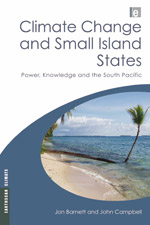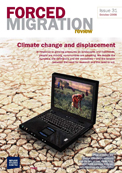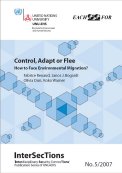 Geographers Jon Barnett and John Campbell bring climate change impacts in small island states to the fore with their new aptly-named book Climate Change and Small Island States. Not that island states didn’t already enjoy popular attention, as the book’s description suggests:
Geographers Jon Barnett and John Campbell bring climate change impacts in small island states to the fore with their new aptly-named book Climate Change and Small Island States. Not that island states didn’t already enjoy popular attention, as the book’s description suggests:
Small Island Developing States are often depicted as being among the most vulnerable of all places to the effects of climate change, and they are a cause célèbre of many involved in climate science, politics and the media. Yet while small island developing states are much talked about, the production of both scientific knowledge and policies to protect the rights of these nations and their people has been remarkably slow.
This book is the first to apply a critical approach to climate change science and policy processes in the South Pacific region. It shows how groups within politically and scientifically powerful countries appropriate the issue of island vulnerability in ways that do not do justice to the lives of island people. It argues that the ways in which islands and their inhabitants are represented in climate science and politics seldom leads to meaningful responses to assist them to adapt to climate change. Throughout, the authors focus on
the hitherto largely ignored social impacts of climate change, and demonstrate that adaptation and mitigation policies cannot be effective without understanding the social systems and values of island societies.
This publication is, as Barry Smit, Canada Research Chair in Global Environmental Change at University of Guelph points out, “a timely check on established paradigms and their effectiveness (or otherwise) in contributing to practical adaptation to climate change in vulnerable regions.”
Meanwhile Jon Barnett has been researching climate adaptation in small island states, particularly through the lens of migration, for some time. His most provocative and recent work released in 2009 was the World Bank-commissioned study “Accommodating Migration to Promote Adaptation to Climate Change.” The paper examines the ways in which climate change may increase future migration, and the risks associated with such migration. It also examines how migration may enhance the capacity of communities to adapt to climate change.
You can see a distillation of his views on climate change in the Pacific in this short video interview with the Woodrow Wilson Center:
No one is currently emigrating from Pacific small island states principally due to climate change, according to Australian geographer Jon Barnett of the University of Melbourne. Barnett situates climate change’s potential future impacts within the broader social, political, and economic challenges for residents of small island states, reminding us that there is great physical and political diversity among these islands.
Stressing the mix of pushes and pulls that motivate people to move, Barnett suggests we examine existing patterns of migration to better
understand how they will develop in the future. He emphasizes that climate change is most likely to push islanders to move due to declining food production and drinking water availability, rather than sea-level rise—despite the iconic image of lapping waves submerging low-lying countries. These sober reminders on the complexity of climate-migration links are worth keeping in mind when evaluating the plethora of new reports on the topic.



